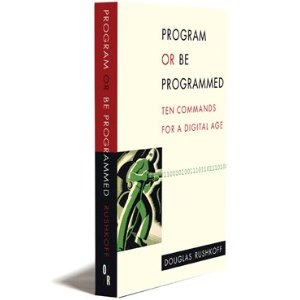
Douglas Rushkoff
Table of Contents
I. TIME Do Not Be “Always On”
II. PLACE Live in Person
III. CHOICE You May Always Choose “None of the Above”
IV. COMPLEXITY You Are Never Completely Right
V. SCALE One Size Does Not Fit All
VI. IDENTITY Be Yourself
VII. SOCIAL Do Not Sell Your Friends
VIII. FACT Tell the Truth
IX. OPENNESS Share, Don’t Steal
X. PURPOSE Program or Be Programmed
5.0 out of 5 stars Re-Humanizing Our Future
December 29, 2010
Brent Finnegan (Harrisonburg, VA, US) – See all my reviews
I haven't read Rushkoff's other books (although I might go back and read Life Inc: How Corporatism Conquered the World, and How We Can Take It Back).
Program or be Programmed is a quick read. I read it on the Kindle my wife got me for Christmas. The irony of reading a book about the pitfalls and possibilities of technology we don't fully understand on a device I don't fully understand was not lost on me.
I would describe this as an “Internet philosophy book” that might fit on the bookshelf somewhere between Neal Stephenson's In the Beginning…was the Command Line and Jeff Jarvis' What Would Google Do? But I found Program to be even more thoughtful and succinct than those books.
Quote from the book: “Instead of learning about our technology, we opt for a world in which our technology learns about us.”
Rushkoff has proposed ten ideas/concepts/considerations for principles to live by online. He starts with the obvious — don't always be online, live in person, be yourself — and builds to the not-so-obvious. By numbers nine and ten, he's making the case for doing away with centralized currency because it's not compatible with the new digital world we've created.
The most intriguing aspect of Rushkoff's worldview is the realization that “we the people” have always been one step behind the technological innovation of the age. From the creation of a written language to the creation of the Internet, the majority of us lag behind the people in positions of knowledge/power who are creating the systems that shape our daily lives.
Quote from the book: “For the person who understands code, the whole world reveals itself as a series of decisions made by planners and designers for how the rest of us should live. Not just computers, but everything from the way streets are organized in a town to the way election rules [are tilted] begin to look like what they are: sets of rules developed to promote certain outcomes.”
The ideas Rushkoff lays out in Program are powerful enough to have convinced me to at least attempt to learn some of the basics about computers and programming.
This book is worth checking out.




